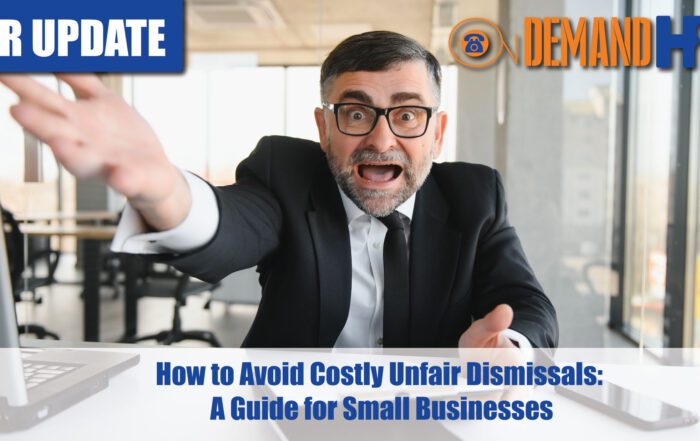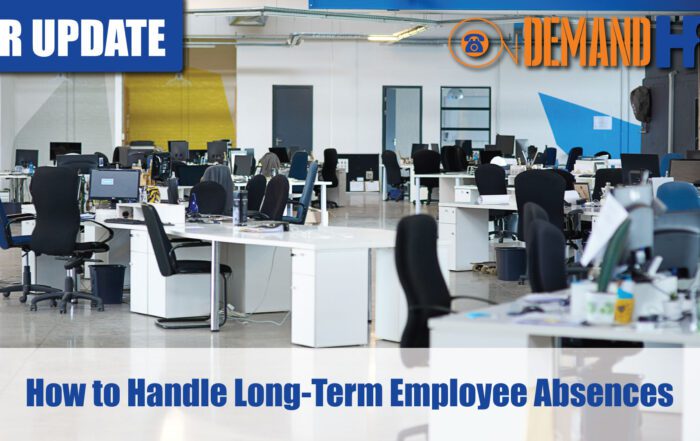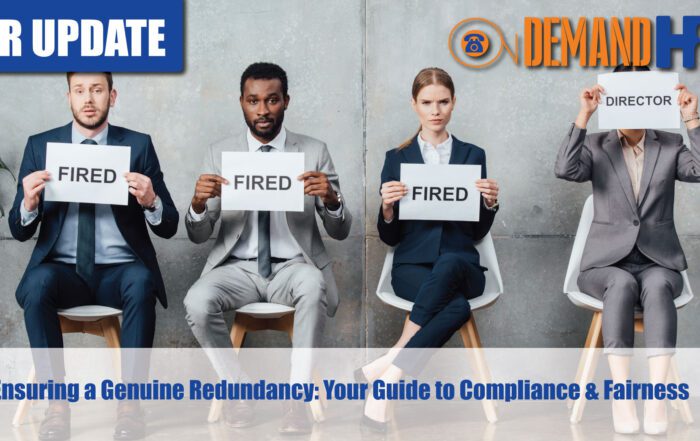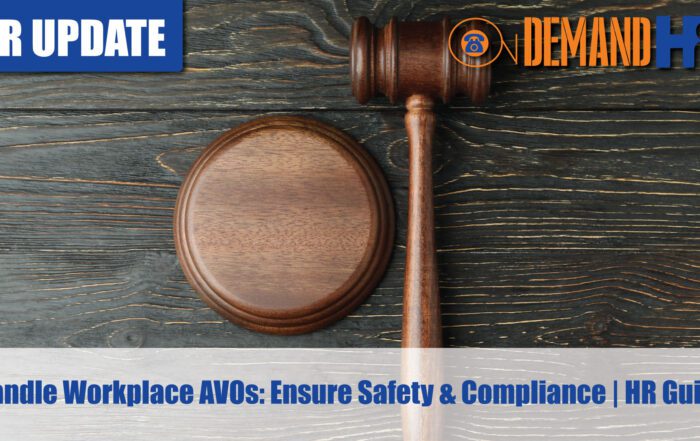Tips & Strategies For EBA Negotiations
Negotiating Enterprise Bargaining Agreements with Unions and employee representatives can be a daunting task for any business. Couple this with the long lasting and expensive implications if you get it wrong and it is no wonder that businesses are unsure of the best way to proceed. This is an excerpt from a longer presentation from Clint Indrele, Managing Director of On Demand HR offering some insights and tips on carrying out an effective EBA negotation process.
Please see below for a full transcript of the video.
Share the HR or workplace relations challenge facing your business and one of our experienced consultants will be in touch within 24 hours with a strategic action plan or discover the best strategy yourself by accessing out free online training library.
Transcript
0:00
We then get into stage two, which is the negotiation meeting. So this will probably happen. Look for a union that’s proactive, this will probably happen about three months before the expiry of the agreement. And that’s why I say six to eight months for the planning, because three months, you might be already negotiating three months before.
So once your planning is complete, if you hit that three month mark, you might as well reach out to the unions and say, Look, we’re ready to, we’re ready to start bargaining, be on the front foot. And consider the log of claims because you will get a log of claims from the unions, they will put a bunch of things there that they want, in this particular enterprise agreement. Allow yourself one to two weeks to respond, don’t be in meetings responding on the fly, or nodding or agreeing to things without giving, giving proper thought. Yes, you have a question? I’m sorry.
Consider the costings associated with various things being put forward as well, because remember, that’s its not just the headline increase. And I’ve seen major, major mistakes in enterprise agreements, that costs organizations, hundreds of 1000s of dollars. And that can come from just going to grab some water. That can come from naively agreeing to something that ends up in that version of the of the EBA, and ends up staying in all sorts of versions, I’ll give you a classic example of this.
So I used to be in an organization, before I started this consulting business, it used to have unlimited or not, not unlimited discretionary sick leave, okay, which was basically code for unlimited sick leave, essentially. So what happened, all sounds wonderful theory that there was a, that you could continue to apply for sick leave, beyond most of us just get 10 days per year. In this situation, you can have discretionary sick leave, that was decided by a discretionary leave group. And the discretionary leave group was two employer representatives, and two employee representatives. And if it’s a draw, if it’s two all draw on the vote, then payment continues. So you can imagine in an organization where the workforce is almost 100% unionized if someone’s if someone’s sick leave gets to, you know, might get to a month or so. And it gets referred to the discretionary leave group. I wonder if anyone can guess what the what the most common voting score was, when they, when they put these discretionary leave situations to a vote, it was almost 99% of the time it was two all. Because what happens is the two employees vote continue paying, the company says stop paying, and you continue paying, we had people on sick leave in these situations, non work related injuries, for something like 15,18 months crazy stuff. Yeah, you’re talking, you’re talking a 70 you’re talking an $80,000 hit on one employee in these situations. So that’s what I mean by, you know, fundamentally, yeah, major, major mistakes in enterprise agreements. And fortunately, the enterprise agreement we negotiated just before I left that organization, after about nine months of negotiation, we finally broke the back of that particular provision. It did cost us in terms of a big accrual for existing employees. But that was better than a discretionary situation. And we introduced something as well, that on third two all vote it would be denied. So the first two are first and second two all vote, the payment will continue in the third one, it would be denied. So we worked out a way of breaking the back of it’s still still much more costly than the average organization. But again, that’s what I’m talking about in terms of longer lasting change, and whether they made any further inroads on that I haven’t actually checked the agreement since then. So be interesting to see whether they did but that’s a classic example of how something very innocent can lead to, you know, major costs.
And other things that the union will throw will be things like, you know, Union training leave and things like that. And then how many employees does that apply to how much time is left out of the workplace and things like that those things can cost money. A lot of other loadings and allowances that we’ll try and not necessarily ask for in the headline rate, but try and sneak in as allowances, those can be very costly in organizations as well, in the, the construction industry, the whole I mean, it’s almost commonplace now the whole site allowance, which is really just an allowance for nothing, it’s just an allowance for for turning up to work. So that’s something you’ll see commonly in the construction industry.
Construction is an interesting one because construction, I mean, whilst none of the organizations really want to have an EBA, they kind of do it in a lot of cases to get on major projects because not having one. Not having one puts them in a position where the principal contractor starts getting pressure from the relevant unions about organizations that are working on these sites that don’t have an enterprise agreement. So it’s more it’s not a requirement, as some people think it’s a requirement is not a requirement. The the, it’s a business necessity for some of the principal contractors because of the opposition they would receive from unions on these things.
So yeah, so I think the other thing, and one thing I found worked very well, in my negotiations last year is be very clear on the relevant business and economic environment. And if if, if things are tough in COVID, make sure that you’re very clear about that in the negotiations, because one thing that one thing is very difficult for unions to argue in enterprise agreements is that if you present the picture that the organization is struggling, that’s run a loss for this year, or whatever, it’s it’s revenues down or whatever, it may be, very hard for the union to argue that, and that, and that can be a good position to enter into negotiations on. And I’m not saying that crying poor should always be the default position. But if that is the reality of the circumstances, well, then that’s important information to share in those negotiation meetings, because what you don’t want to create the impression is that everything’s just, you know, humming along as normal, and we’ve got unlimited money to spend on increases or changes or, or, you know, new new conditions in the EBA, you want to present a reality of, you know, the company’s negotiation position, and that works particularly well.
And for organizations that are delaying dealing with their enterprise agreements, I’d say this to them that now’s actually a great time to be negotiating EBA’s probably the best time, I would say, in the last almost 20 years, because you’ve got the COVID, I don’t wanna say the COVID excuse, but the COVID situation that certainly has impacted on businesses one way or another, a number of a number of businesses have entered into temporary or short term, you know, financial difficulties, as a result of that. Some of them more long term, of course. And you can negotiate a four year deal, which might be, which might be based on your financial difficulties, which might only be one year of problems.
So negotiating now is actually quite a, if you’re ever thinking about doing an EBA for the first time, or you’re or you’re, you’re dealing with one that’s expired or something like that, now’s a good time to be dealing with it, don’t wait till the end of COVID, you wait to the end of COVID, well, then you’re going to get bigger demands you’re going to get why would I? Why would I? Why would I have my reduced demands? If I’m a union, if the COVID situation is blown over? Why would I ask for less at the end of COVID, then during COVID, so it doesn’t make sense to do that.
And provide a response to that log of claims by way of presentation. So what we what I would normally do in the negotiation meetings is run through each of the union’s proposals and tell them why we can or can’t accommodate them, and some we will, some won’t. It’s it’s always it’s a negotiation, ultimately.






